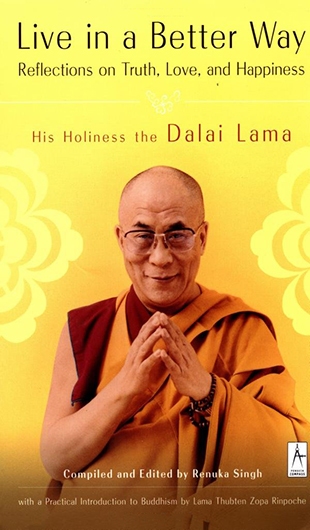Renuka Singh, an Associate professor at Jawaharlal Nehru University in New Delhi, India, has compiled and edited these lectures given by the Dalai Lama in 1988. They delineate certain essential elements of the Buddhist way of living, such as the journey to happiness; solving personal, national, and international problems with compassion and nonviolence; and the path of spiritual practice through renunciation, bodhicitta, and the wisdom of emptiness.
In the introduction, Lama Thubten Zopa Rinpoche, spiritual director of the Foundation for the Preservation of the Mahayana Tradition, a worldwide Tibetan Buddhist organization, talks about the goal of life as benefiting others. This is the theme of the Dalai Lama’s first lecture on transforming the mind. Here he assesses the positive emotions of love, compassion, and forgiveness and the negative emotions of anger, jealousy, hatred, doubt, suspicion, and fear.
One of his most important points is that a strong ego is not necessarily a bad thing. It can be an ally to accomplishing good through determination. The opposite is the selfish or foolish ego which puts down others and always emphasizes dominance. Desire to bring about positive and purposeful change is commendable whereas the greedy desires of “I want this and I want that” lead only to grasping and clinging. As usual, the Dalai Lama’s commentary on the important role of emotions in human life is something to cherish.
Other lectures explore the value of cooperation between the world’s religions; the need to consider our neighbors as sacred and superior to ourselves; and the importance of viewing the whole of humanity as one family. Toward these ends, the Dalai Lama recommends the following: “Pay attention not only to the cultivation of knowledge but to the cultivation of qualities of the heart, so that at the end of education, not only will you be knowledgeable but you will also be a warm hearted and compassionate person.
